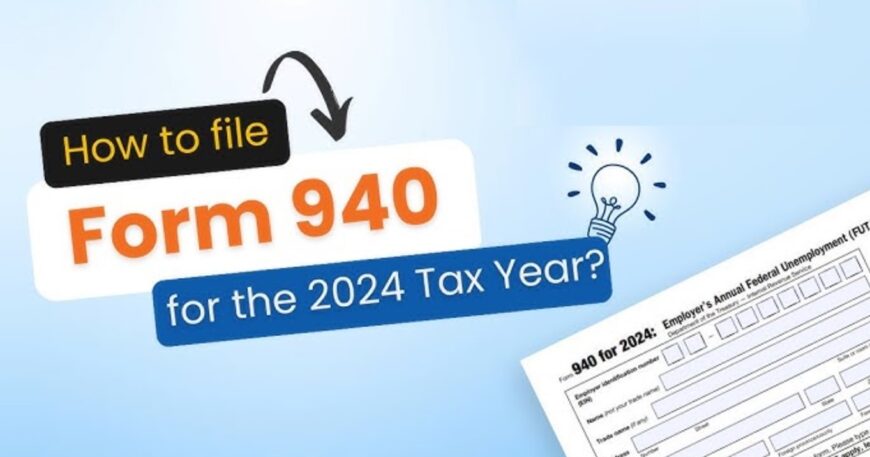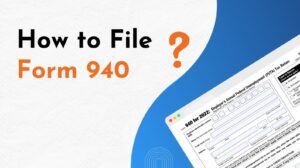Filing taxes can be a confusing process, especially for business owners who need to navigate complex forms like the IRS Form 940. Knowing when and how to file this form is important to staying compliant with the IRS. In this complete guide, we will walk you through everything you need to know about IRS Form 940, including what it is, why it’s important, how to fill it out, and where to mail it for 2024.
What is IRS Form 940?
IRS Form 940 is an annual report form that an employer uses to report and pay his or her Federal Unemployment Tax Act (FUTA). FUTA is a payroll tax that an employer pays to contribute to the unemployment program that offers unemployment benefits for workers who become unemployed. The good news for employees is that they do not pay FUTA; rather, it’s the employer who pays this payroll tax.
Form 940 is the return used to report the amount of FUTA tax that an employer owes for the year and to ensure that the proper payments are made to the IRS.
Who Must File IRS Form 940?
If you are an employer in the United States, you may need to file Form 940 if:
– You paid wages of $1,500 or more in any calendar quarter during the year.
– You had one or more employees for some part of a day in 20 or more different weeks in the calendar year.
.
The FUTA tax affects most businesses that have employees. However, there are a couple of exceptions. For example, some small business employers and state and local government employers are exempt from paying the tax.
Form 940: What’s New for 2024?
As of now, IRS Form 940 for 2024 is mainly the same as previous years; however, the following are updates you should pay attention to:
Threshold Changes: Your business may have to pay for specific state unemployment tax laws; therefore, its FUTA eligibility threshold can change. Remember to check up on the prevailing rates and thresholds to determine which filing requirement 2024 necessitates.
-New Instructions Every year, the IRS may revise the instructions or issue new guidelines to help taxpayers comply. Read new instructions available on the IRS website before filing your 2024 Form 940.
Late Payment Penalty: The IRS strictly imposes penalties on employers who fail to file Form 940 within the given time or pay the right FUTA tax. For 2024, penalties for missing the deadline or late payment might be slightly higher, so it is better to file as early as possible.
How to Complete IRS Form 940
Filling in an IRS Form 940 could appear to be difficult, but proper instructions help simplify the whole process. Let’s go step by step, as follows.
Step 1: Fill in the Basic Information
Along the top part of Form 940, fill in your business details:
EIN: Obtain an EIN from the IRS if you don’t already have one. It is a number that uniquely identifies your business.
Business Name: This is your business’s legal name.
Business Address: This is the address that your business is associated with.
Step 2: Calculate Your FUTA Taxable Wages
Next, you’ll need to calculate your FUTA taxable wages. FUTA applies to wages paid to employees who are not specifically exempt from the tax.
Wages Subject to FUTA: On line 3 of Form 940, you’ll need to report your total taxable wages. The amount of wages subject to FUTA is generally capped at $7,000 per employee per year.
Exceptions: FUTA tax does not apply to certain types of compensation, including fringe benefits, tips, and other non-cash compensation.
Step 3: Calculate FUTA Tax
The FUTA tax rate is usually 6.0% of the first $7,000 in wages you pay to each employee. However, if you qualify for the state unemployment tax credit (SUTA), your FUTA tax rate will be reduced to 0.6%. The SUTA credit is available to businesses that pay state unemployment taxes on time and in full.
Line 4: Multiply your total FUTA taxable wages by the FUTA tax rate (usually 6% unless you qualify for the SUTA credit).
Line 5: Report any adjustments for overpayment or underpayment of FUTA taxes from previous years.
Step 4: Report Additional Adjustments and Payments
Line 7: If you made federal unemployment tax deposits during the year, you’ll report those on this line. Payments reduce what you owe on Form 940.
Line 8: If you have additional FUTA tax, report the amount here.
Step 5: Sign and Date
After completing the calculations, sign and date the form. The IRS requires a signature to confirm that the information you’ve provided is accurate.
Form 940 Instructions: Detailed Overview
The IRS provides specific instructions for completing Form 940. Here are some key instructions for 2024:
1. Make Sure All Information is Correct: Always double-check the EIN, business name, and address to avoid delays.
2. Report FUTA Taxable Wages Correctly: Report only wages subject to FUTA tax. Don’t forget, the wage limit is $7,000 per employee.
3. Take the SUTA Credit: If you qualify for the state unemployment tax credit, apply it to lower your FUTA tax. You will need to provide state-level documentation of your unemployment tax payments.
4. Filing Deadline: Form 940 is due on January 31st of the next year, but if you’ve already deposited the full FUTA tax due on time, you get an extra 10 days to file (by February 10th).
5. Penalties for Late Filing: The IRS charges penalties if you file after the deadline or fail to pay the required tax. The penalty begins at 5% of the tax due for each month the return is late, up to a maximum of 25%.
Where to Mail IRS Form 940
If you have to mail your Form 940, it is very important to address it to the right IRS office. The mailing address varies depending on the location of your business and whether you are sending in a payment.
1. If you are NOT enclosing a payment:
– Internal Revenue Service
P.O. Box 1303
Charlotte, NC 28201-1303
2. If you are enclosing a payment:
Internal Revenue Service
P.O. Box 932300
Louisville, KY 40293-2300
If you’re unsure about the exact address or if you’re filing from outside the U.S., refer to the IRS Form 940 instructions for updated mailing information.
Common Mistakes to Avoid When Filing Form 940
Many employers unknowingly commit common errors when preparing their Form 940, thereby delaying their return or incurring penalties. Here’s what to watch out for:
1. Incorrect EIN: Double-check your employer identification number. The IRS cannot process a return if the EIN is incorrect.
2. Failure to file on time: Always file within the deadline to avoid paying penalties. In case you do not know the exact date when you have to file, mark it on your calendar for a reminder.
3. Failure to claim the SUTA Credit: In case you qualify for the SUTA credit, never fail to apply it. Failure to claim the SUTA credit would increase your FUTA tax payments.
4. Inadequate or Missing Information: Make sure that all information is filled out completely and correctly, especially the total taxable wages and the amount of tax you owe.
When to File Form 940
The deadline to submit IRS Form 940 is January 31st of the following calendar year in which you are reporting. But if you’ve paid all your FUTA taxes by the deadlines, you get until February 10th.
Penalties and interest will apply on any amounts left unpaid in the event you don’t make it by the deadline.
Conclusion: Why Filing on Time Counts
Filing Form 940 is essential for businesses to remain compliant with federal unemployment tax laws. If you know how to fill out the form correctly, keep track of your taxable wages, and ensure that your payment schedule is accurate, you can avoid unnecessary penalties and stress.
At Syed Professional Services, we will walk you through the complexities of tax filing to ensure your business is in good standing with the IRS. We can help you with Form 940 and any other tax-related issues. Our team is here to help you navigate the process. Contact us today to learn how we can help streamline your tax filing process.





